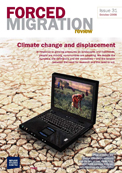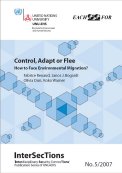Last week, New Orleans not only hosted Mardi Gras, but also the 2010 ISA Annual Convention. The International Studies Association (ISA) was founded to promote research and education in international affairs, and its annual convention is usually a who’s who of academics, journalists, and policy makers. This year’s conference, with the theme of “Theory vs. Policy? Connecting Scholars and Practitioners,” was no exception. Although chock-full of noteworthy presentations over its four-day run, one seminar was of particular interest: “Forced Environmental Migrants: Challenging the Gap Between Normative Human Rights and ‘Refugee’ Policy.”
Nicole Marshall, a professor at the University of Alberta, argues for environmental migrants’ rights from a philosophical standpoint, as developed in her working paper. She bases her argument off of “moral imperative” (p. 7) and, more specifically, on Kant’s “principle of hospitality.” Theoretically, a person displaced by environmental factors could be defined as a temporary visitor while
in another state and should, therefore, be granted the right of entry into another country because hospitality “is not a question of philanthropy, but of a right” (p. 9). Kant, she claims, also gives us a basis on which to navigate the space between civil rights, as traditionally defined by state-citizen relationships, and human rights; which, ultimately, is the gray area where environmental migrants lie.
Marshall also draws on Joseph Carens’ work on immigration rights using the Rawls’ principles of justice. Carens argues that arbitrary factors are essentially unjust (p. 10) – i.e. where you are born determines your future prospects in life – and need to be rectified in a tangible way – i.e. open borders allow you to move to wherever you decide you have the best future prospects. Since “most environmentally devastating events are arbitrary in location, scope, and impact;” those most egregiously affected by them should be able to move wherever they believe will be without risk and where they can lead a sustained “good” life.
While Marshall makes a case for global moral responsibility and who should take the brunt of it (hint: developed countries who contribute more to climate change and its consequently negative effects), she doesn’t make a particularly convincing case for policy makers or pragmatists, in general, to follow. It is one thing to say the world has a moral responsibility to protect environmental migrants; it is another thing to act upon it.
However, she does offer up one compelling idea: the breakdown of environmental migrants into distinct categories. The four categories she offers are:
- Imperative Environmental Migrants: persons who have been permanently and irrefutably displaced from their homes and/or livelihoods primarily as a result of environmental factors. Ex. Tuvalu, the Maldives, Bangladesh.
- Pressured Environmental Migrants: persons whose traditional habitats and lifestyles are increasingly less viable because of slow-moving, but devastating processes like desertification. Ex. Tunisia, China, Morocco.
- Temporary Environmental Migrants: persons who experience a short-term forced migration resulting from a one-time severe environmental event. Ex. Survivors of Hurricane Katrina or the 2004 Indian Ocean Tsunami.
- Human Environmental Migrants: persons who are displaced from their home or livelihood as a result of human conflict over limited environmental resources. Ex. Sierra Leone, DR Congo, Angola.
Although some of the categories may be a little alarmist (and many “human environmental migrants” are already categorized as IDPs in their respective countries), the proposal to break down environmental migration definitions is a step in the right direction towards recognition. Some countries may be more apt to accept “temporary environmental migrants” over “pressured environmental migrants.” In fact, the definition of refugee or internally displaced persons is a major source
of contention. Let us hope that we can continue the conversation, and eventually steer it towards action.
This is an original article by Towards Recognition contributor Kayly Ober.




This is a well written and formulated article on this important yet complex issue